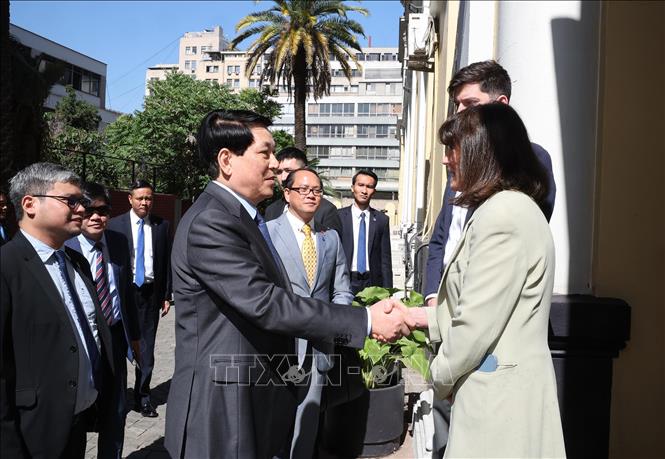
The University of Chile is the largest and oldest educational institution in Chile and one of the oldest educational institutions in the Americas. Founded in 1842, the University of Chile has a rich history of academic, scientific and expansion, participating in solving many national and regional problems, and making many contributions to the development of Chile. This is an educational and training institution with a long history and reputation in Chile and Latin America, with high-quality multidisciplinary training programs. The University of Chile has trained many great scientists, cultural figures, and many influential international figures, including two Nobel Prize winners for Literature. In particular, many presidents of the Republic of Chile, including the current President Gabriel Boric, studied at this school.
Speaking here, President Luong Cuong mentioned a number of issues on the foundation of Vietnam-Chile relations, Vietnam's development path and foreign policy, as well as the vision and orientation of the traditional friendship and comprehensive partnership between Vietnam and Chile in the new era.
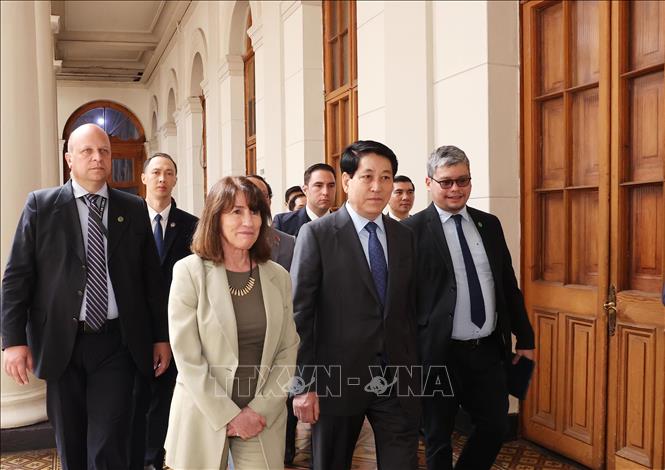
Special similarities
President Luong Cuong said that despite being half a world away, Vietnam and Chile always have a special bond and a feeling of closeness whenever they talk about each other. This comes from many rare similarities between the two countries from history, culture, geography, to economic development model and vision of the current world.
Sharing about the history of the two countries' struggle for national independence, the President said that Vietnam and Chile are both developing countries, members of the Non-Aligned Movement, with a long and glorious history of fighting for national independence; and at the same time have strong determination and efforts to develop the country.
The President stressed that the Vietnamese people will never forget the solidarity that the Chilean people showed to Vietnam during the difficult years of the struggle for national independence, most notably the anti-war protests in Vietnam by Chilean youth and students. The song “The Right to Live in Peace” by musician Victor Jara, a former student of the University of Chile, about Uncle Ho – President Ho Chi Minh is a testament to the common aspiration for peace and national independence that the two countries share.
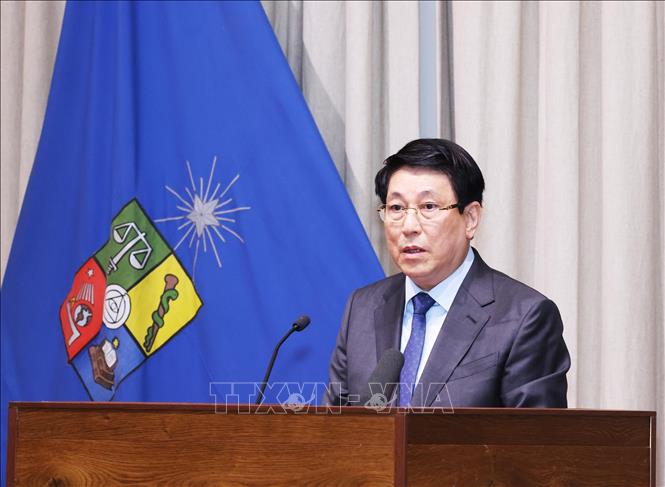
Meanwhile, according to the President, in terms of economy, both Chile and Vietnam are two economies that rely mainly on exports and attach importance to the international integration process to promote national development. This is demonstrated by the fact that both Vietnam and Chile are members of international organizations and major multilateral and inter-regional free trade agreements such as the World Trade Organization (WTO), the Comprehensive and Progressive Agreement for Trans-Pacific Partnership (CPTPP), the Asia-Pacific Economic Cooperation Forum (APEC), the Forum for East Asia-Latin America Cooperation (FEALAC), etc.
The President affirmed that with an open and inclusive vision, supporting trade liberalization, both countries share a common perception of building and strengthening a multipolar, equitable world order based on international law, in which Southern countries play an increasingly important role and voice. Both Vietnam and Chile have committed to and are implementing drastic measures to achieve emission neutrality by 2050. Both countries see the importance of green, sustainable development, energy transition, digital transformation, as well as the need to properly manage strategic minerals.
Appreciating the remarkable socio-economic development achievements of Chile, the first country in Latin America and one of the few developing countries to have overcome the “middle-income trap”, the President said that Chile is a typical example of making the most of the globalization process and trade liberalization to develop the country.
The President affirmed that Chile is increasingly affirming and promoting its position and role in the region and the world, and expressed his wish to continue to learn from Chile's valuable experiences in economic development, aiming to bring Vietnam into the ranks of developed countries by 2045.
Vietnam's development path and foreign policy
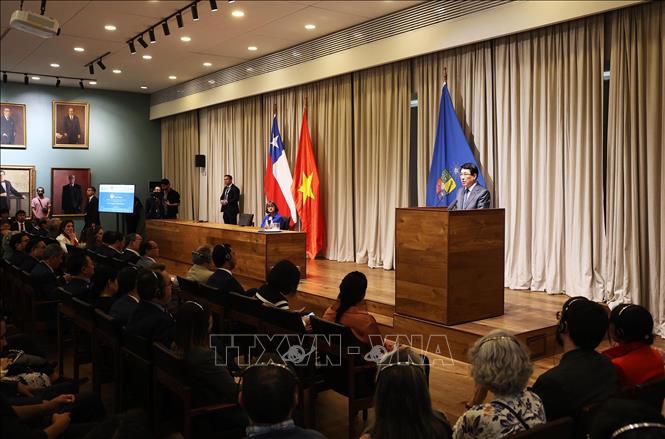
Referring to Vietnam's development path, the President said that after nearly 80 years of founding the country and nearly 40 years of Doi Moi, Vietnam is standing at the historic starting point of a new era - the era of the Vietnamese people's rise. From a poor, backward country, heavily devastated by war, besieged and severely embargoed, Vietnam has risen to achieve great and historic achievements, becoming a middle-income developing country with strong and deep international integration. After nearly 4 decades since the implementation of Doi Moi, the scale of Vietnam's economy has increased 95 times, ranking 35th among the 40 largest economies in the world and among the top 20 economies in the world in terms of attracting foreign investment and trade scale.
In terms of foreign affairs, from being isolated, Vietnam has established diplomatic relations with 194 countries, a network of 32 Strategic Partnership and Comprehensive Partnership frameworks, including all 5 countries that are Permanent Members of the United Nations Security Council and the economies of the Group of 7 (G7). Today, Vietnam has trade relations with over 220 countries and territories, with trade turnover in 2023 reaching 683 billion USD and could reach a record figure of nearly 800 billion USD this year. With 17 free trade agreements (FTAs), total foreign direct investment (FDI) reaching nearly 450 billion USD, with more than 41,000 projects from more than 143 countries and territories, Vietnam has become an important link in the supply chains of the Asia-Pacific region and the world.
The President pointed out that Vietnam is also a bright spot in implementing the Millennium Development Goals and the United Nations 2030 Agenda for Sustainable Development. Vietnam considers climate change mitigation as one of its top priorities. In the development process, Vietnam always attaches importance to and implements a specific policy system to ensure that all people enjoy the fruits of development and innovation. Although per capita income is still at a low average level, Vietnam's Human Development Index (HDI) has always been in the high group for many years.
The President emphasized that the world is in a period of epochal change, but for Vietnam, one thing remains unchanged: Under the leadership of the Communist Party of Vietnam, Vietnam is steadfast in its goal of “national independence associated with socialism”, taking that as its ideology and guiding principle to protect and develop the country. Vietnam’s goal by 2030 is to become a developing country with modern industry and high average income; by 2045, to become a developed country with high income.
The President affirmed that Vietnam will continue to consistently implement its foreign policy of independence, self-reliance, peace, friendship, cooperation and development, multilateralization and diversification of relations, being a friend, a reliable partner, an active and responsible member of the international community; proactively and actively integrating deeply and comprehensively into the world. Vietnam shares the views of other countries on the importance of ensuring a peaceful and stable environment in the regions, and wishes to demonstrate responsibility and continue to contribute more to world politics, the global economy and human civilization.
The President stated that Vietnam understands very well the value of peace, loves peace and believes that peace is a prerequisite for development. Therefore, inheriting the tradition of peace and harmony, Vietnam persists in its four no's defense policy: (1) Not participating in military alliances; (2) Not aligning with one country to fight another; (3) Not allowing foreign countries to set up military bases or use its territory to fight against another country; (4) Not using force or threatening to use force in international relations. Vietnam also always strongly supports the settlement of disputes and disagreements by peaceful means on the basis of the United Nations Charter and international law, opposing unilateral actions, power politics, the use or threat of use of force in international relations.
The President said that in the context of increasingly fierce and complicated strategic competition between major powers, the role of Southern countries as well as South-South cooperation will be increasingly valued. Vietnam has always proactively and actively participated and contributed with a constructive spirit and the highest responsibility to common efforts, successfully assuming important responsibilities in many important multilateral mechanisms, participating in the United Nations peacekeeping force and international search and rescue.
Vision and orientation of Vietnam - Chile relations
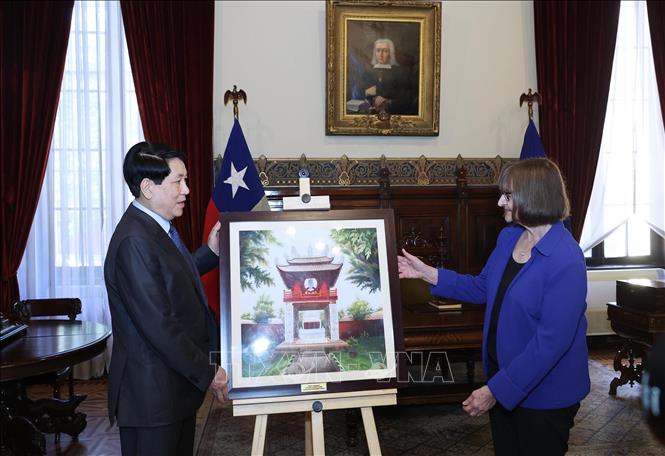
Reviewing the history of the friendship between Vietnam and Chile over the past 50 years, the President said that during the talks and meetings with Chilean leaders, the two sides agreed on the principles and directions of major cooperation to bring the Comprehensive Partnership to a new height, more extensive, effective and substantive. The two sides also reaffirmed common values such as valuing peace, the spirit of independence and self-reliance, upholding multilateralism, respecting international law and the strength of international friendship and solidarity.
On the solid foundation of more than 50 years of bilateral relations, historical similarities and common vision of the world, and high economic complementarity, the President proposed a number of orientations for Vietnam-Chile relations in the coming period, in which the two countries need to strengthen political trust and substantive cooperation through exchanges of high-level delegations and all levels, enhance mutual understanding and mutually beneficial cooperation in areas where both sides have potential and strengths, including exchanges and cooperation between the Communist Party of Vietnam and major political parties in Chile.
The President proposed to strengthen the promotion of links between the two economies of Vietnam and Chile, identifying economic cooperation as a top priority and a key area in the bilateral relationship. In particular, continuing to take advantage of and effectively implement the bilateral Free Trade Agreement (FTA) and the mechanism of the Vietnam-Chile Free Trade Council, as well as the Comprehensive and Progressive Agreement for Trans-Pacific Partnership (CPTPP) to create new momentum to bring trade and investment relations between Vietnam and Chile to new milestones.
Along with that, the President said it is necessary to further promote bilateral investment opportunities as well as identify priority areas of strategic breakthrough cooperation, helping to connect the two economies, towards sustainable development, contributing to global prosperity, especially in the fields of green transformation, climate change response, building appropriate cooperation frameworks in international organizations, forums and mechanisms of which both sides are members.
The President also proposed promoting educational cooperation, cultural and artistic exchanges and developing tourism cooperation, thereby enhancing people-to-people exchanges and mutual understanding. In that process, the University of Chile can make important contributions and Vietnam encourages cooperation between universities of the two countries. This is an extremely important factor to promote understanding, knowledge sharing and innovation cooperation.
On the other hand, according to the President, in a world with many changes and challenges, small and medium-sized countries like Vietnam and Chile must strive to contribute more actively to global governance, together promoting multilateral approaches and international law. Many new international issues such as green development, energy transition, and artificial intelligence governance need a more comprehensive international framework soon.
Vietnam and Chile need to continue promoting multilateral cooperation, respecting international law, maintaining security, safety, freedom of navigation and aviation in seas and oceans, including the Pacific Ocean, in accordance with international law, especially the 1982 United Nations Convention on the Law of the Sea (UNCLOS).
The President expressed his belief that with the tradition of good relations, goodwill and potential for comprehensive cooperation between the two sides, the Vietnam-Chile relationship will continue to reach new heights, for the benefit of the two peoples, for peace, cooperation and development in the two regions and the world.
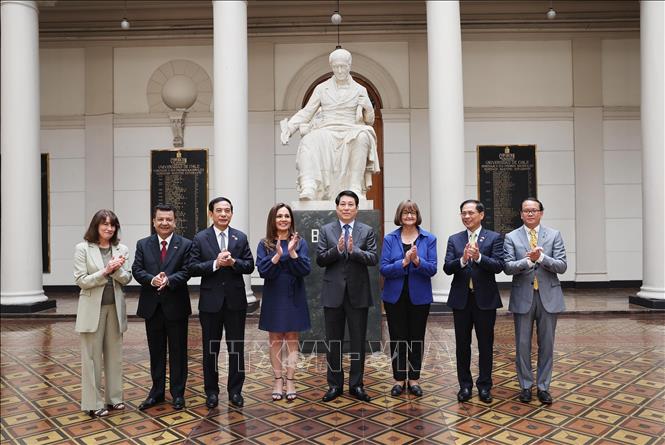
* This is the final activity during the official visit to the Republic of Chile by President Luong Cuong and the high-ranking Vietnamese delegation. On the afternoon of November 12 (local time), the President and the high-ranking Vietnamese delegation departed for an official visit to the Republic of Peru and to attend the APEC 2024 Summit Week in Lima, Peru from November 12 to 16.


![[Photo] General Secretary To Lam and National Assembly Chairman Tran Thanh Man attend the 80th Anniversary of the Traditional Day of the Vietnamese Inspection Sector](https://vphoto.vietnam.vn/thumb/1200x675/vietnam/resource/IMAGE/2025/11/17/1763356362984_a2-bnd-7940-3561-jpg.webp)





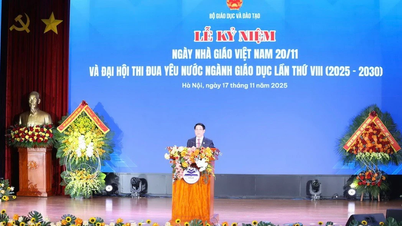

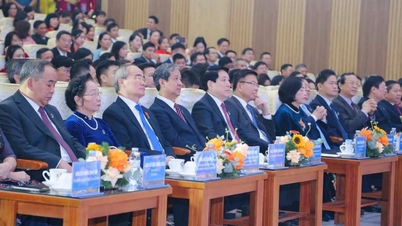

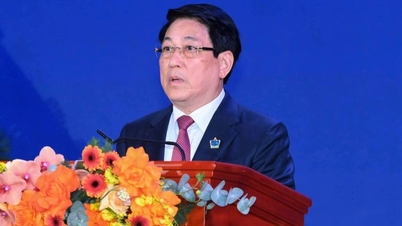

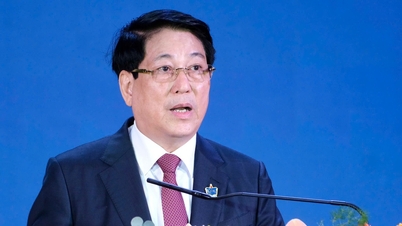

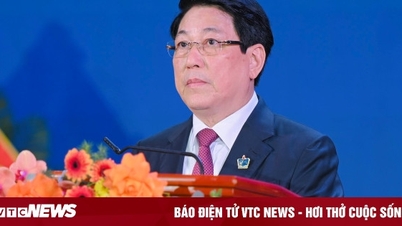



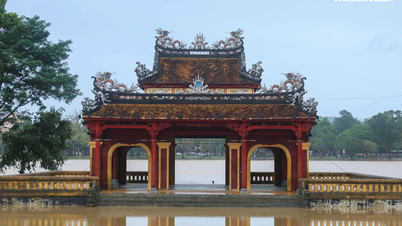

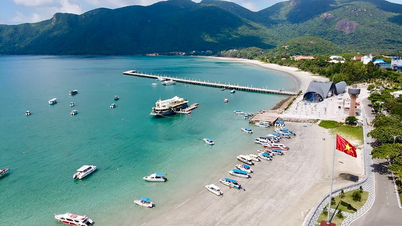
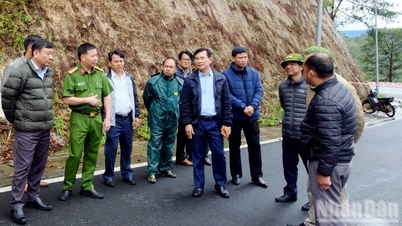


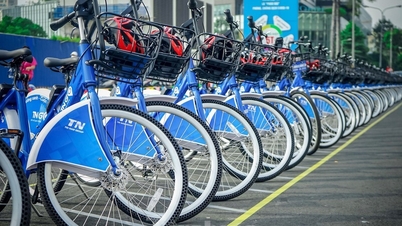








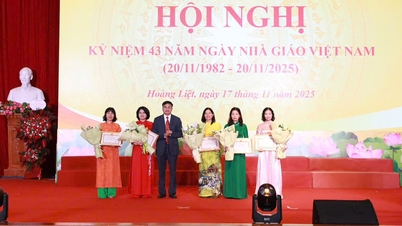
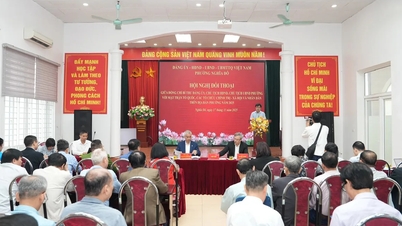
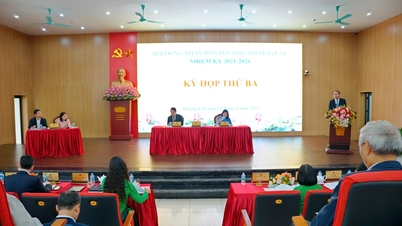
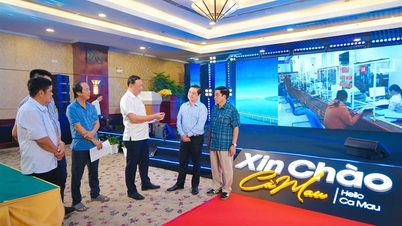
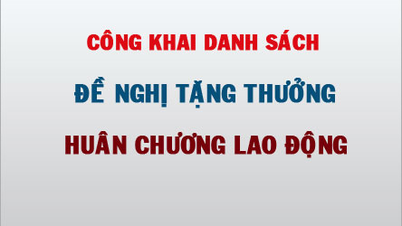

















































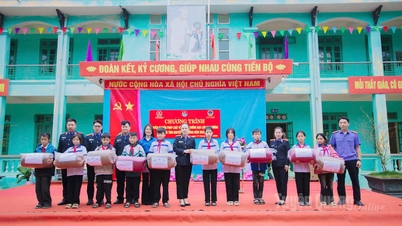

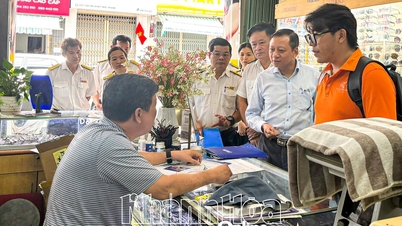

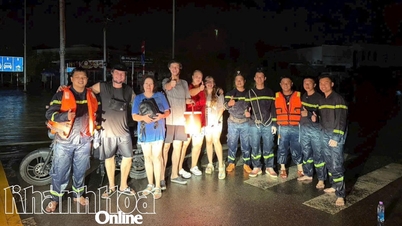
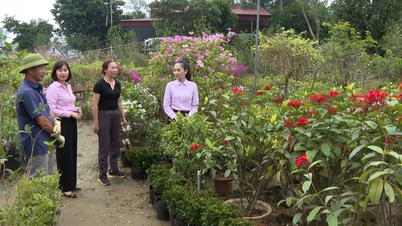

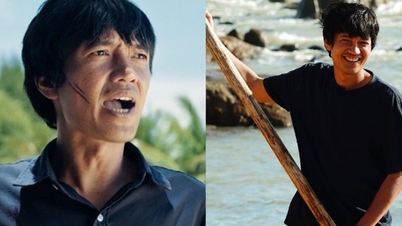
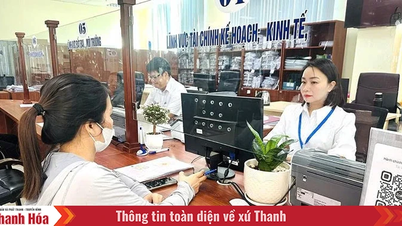













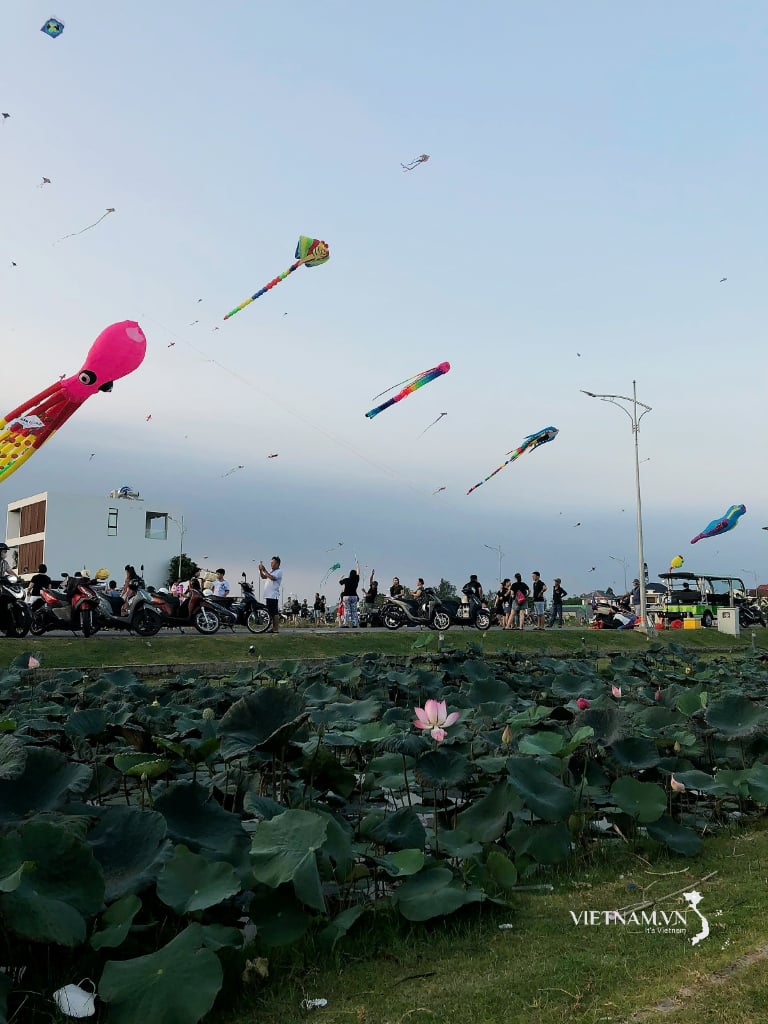
Comment (0)